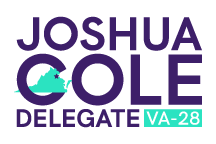For over two decades, I’ve been fortunate enough to call the 28th District my home. But as I look around today, I see more and more families expressing difficulty finding an affordable place to live in Fredericksburg and Stafford County. Currently, the Commonwealth offers only 37 affordable housing units for every 100 low-income residents.
We know why this happens. With many in the district shuttling up I-95 for work every day, six-figure salaries from the NoVA area end up here in our area. Developers see these opportunities and our housing stock is proof of that. Those dollars and dealers inflate home values, pricing out the hardworking residents who work to keep our district moving forward. Shouldn’t the residents who work to make this community feel like home be able to afford a home of their own?
Our government can take meaningful steps to ensure that rent-controlled, workforce housing is available to all Virginians. I was proud to stand with Del. Convirs-Fowler as she introduced a bill to further restrict discrimination in housing practices. There is still work to be done as a wide homeownership gap exists here in the heart of the 28th-District in Fredericksburg City, with 42% of white households reporting homeownership compared to 20% of black households and 31% of Hispanic households in 2017. I will fight to bridge this gap.
We need to address our housing crisis with real solutions, not more empty rhetoric, and that’s why I support:
(1) The creation of a Virginia Housing Tax Credit that would serve as a companion to the Federal Low Income Housing Tax Credit (LIHTC). According to the Campaign for Housing and Civic Engagement (CHASE), the LIHTC program has had a profound impact across the Commonwealth over the last several decades. Since 1996, over 88,000 affordable apartment homes have been constructed or rehabilitated, with such housing contributing over $1 billion every year to local economies across the state. A state companion credit could further close funding gaps and create additional affordable apartments through expanded resources.
(2) Appropriating additional funding to the Virginia Housing Trust Fund (VHTF). In 2019, the General Assembly appropriated $11 million to the VHTF, however, during the last round of funding, development proposals of more than $17 million were submitted. At our current funding levels, the Virginia Department of Housing and Community Development can only support 1 out of 4 qualified projects submitted. That is unacceptable.
(3) Promoting Inclusionary Zoning through expanding Virginia’s existing inclusionary zoning legislation to enable any city or county across the Commonwealth to adopt an individually tailored zoning ordinance with the option for mandatory set-asides by making Va. Code §15.2-2405 applicable to every locality across Virginia.
This is just the beginning though, and we’ve got a lot of work to do. Together, we will make the 28th a place for everyone to live and work.
